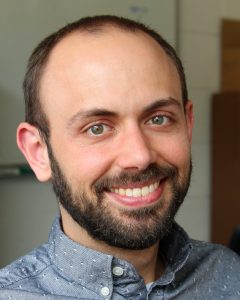
UTTRI associated faculty Professor Michael Widener‘s research will benefit from a recent grant awarded across the ocean, to Dr. Mark Green in Liverpool.
The University of Liverpool awarded Dr. Green an Early Career Researcher Grant to support new collaborations and research activities. His grant project “Leveraging machine learning for understanding the geographical determinants of dietary behaviours” will run from November 2018 until July 2019, and will facilitate travel and meetings between the two professors. Dr. Green plans to travel here to the University of Toronto to work with Prof. Widener in the spring of 2019.

Green and Widener will work closely, building on Widener’s work with the Canada Food Study, which is itself a collaborative project with more than a dozen researchers.
Green contributes unique data science skills to process Widener’s data in new ways, tackling some of the analytical issues present in the project.
They expect the partnership to develop several outputs, each extending Widener’s previous work in how neighbourhoods shape people’s dietary behaviours.
Liverpool / University of Toronto collaborations
The grant will develop a new collaboration between Green and Widener, however it will also build on several other collaborations:
- Green’s PhD student Alec Davies is undertaking a research internship in 2019 with Widener;
- Dr. Dani Arribas-Bel recently visited the University of Toronto and delivered his Introduction to Geographic Data Science course;
- Drs Frances Darlington-Pollock and Francisco Rowe have been working closely with U of T in developing a new field class to Toronto; and
- Professor Alex Singleton has been exploring new avenues with researchers on analyzing new forms of data.
Better decision-making the goal
Local and national governments have sought to regulate the location of unhealthy food outlets to try and encourage improved dietary behaviours. However, many of these decisions are based on poor or misleading data. The project will use new methods to analyse novel data on how individuals engage with food outlets, to provide the most rigorous evidence available to assess how governments should introduce new policy to tackle issues such as obesity. It builds on work that Green has been leading through the Access to Healthy Assets and Hazards project which is being used by Public Health England.
About Dr. Mark Green
Dr. Green is a Lecturer in Health Geography at the University of Liverpool, Liverpool, UK. His research examines the geographical determinants of health using big data and machine learning. He focuses on the idea that individuals do not live in a social vacuum, but are shaped by the world around them: the air that they breathe, the food that is available for purchase nearby, whether they live in a nice leafy suburb, or if they are close to their doctors. All of these things imprint on their health and health-related behaviours. Through exploring the extent that these geographical features matter, Green believes that we can start to build healthier environments and neighbourhoods that promote health.
Twitter: @markalangreen
